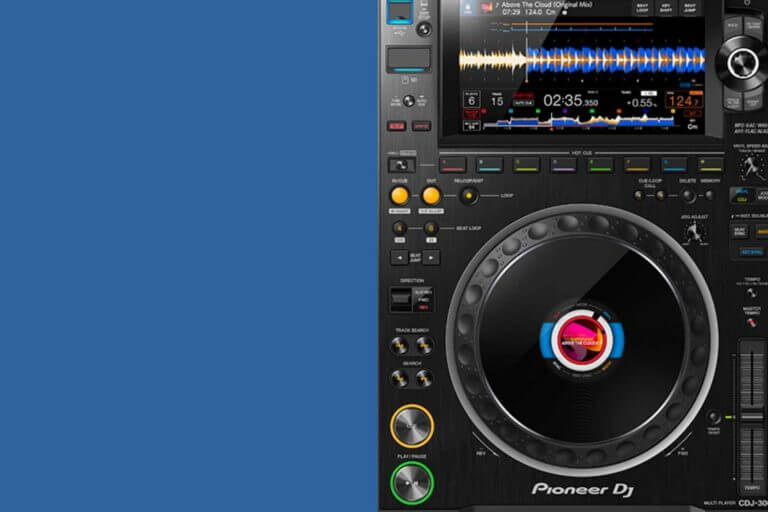So what is a CDJ exactly? I say this as it is more than likely that if you’re just starting out as a DJ, odds are that much of what you’ve learned about or practiced largely revolves around the DJ controller.
This makes sense as, while several different types of DJ devices have come out, the controller is one of the simplest, accessible, and most all-encompassing options available.
Still, just because it’s the simplest doesn’t inherently mean it’s the best, and as you grow and develop your own unique and personalized way of DJing, there’s a good chance you’ll outgrow the controller’s beginner/intermediate-friendly setup, instead of looking at one of those other, more advanced and involved options of either the old-school turntable or the venue workhorse, the CDJ.
Both the turntable and the CDJ are great options and can lead to some big developments in you as a DJ, provided you know what you’re doing.
And, while there has always been a lot of talk about the turntable and how it has grown and evolved over the years to stay modern and relevant, there has been surprisingly little talked about as it pertains to the CDJ.
The CDJ is certainly the “reliable Joe” of the digital DJ hardware world!
Here, we’ll get into what makes the CDJ different from either the turntable or the DJ controller. We’ll also get into many of its advantages and disadvantages, as well as the reason why the CDJ (Pioneer DJ’s machines in particular) have become the undisputed heavyweight champ when it comes to performing at clubs and public event venues, more so than either the turntable or the DJ controller.
What is a CDJ? (in short)
Firstly, CDJ stands for Compact Disc Jockey. A CDJ is a specialized digital music player for DJs. It was originally designed to solely play music from compact discs (CDs), however, the technology has evolved and media can be played from digital music files stored on USB flash drives or SD cards. Typically, two CDJs are plugged into a DJ mixer. CDJs have jog wheels and pitch faders that allow music to be mixed in a similar fashion to how a DJ would mix vinyl records on DJ turntables.
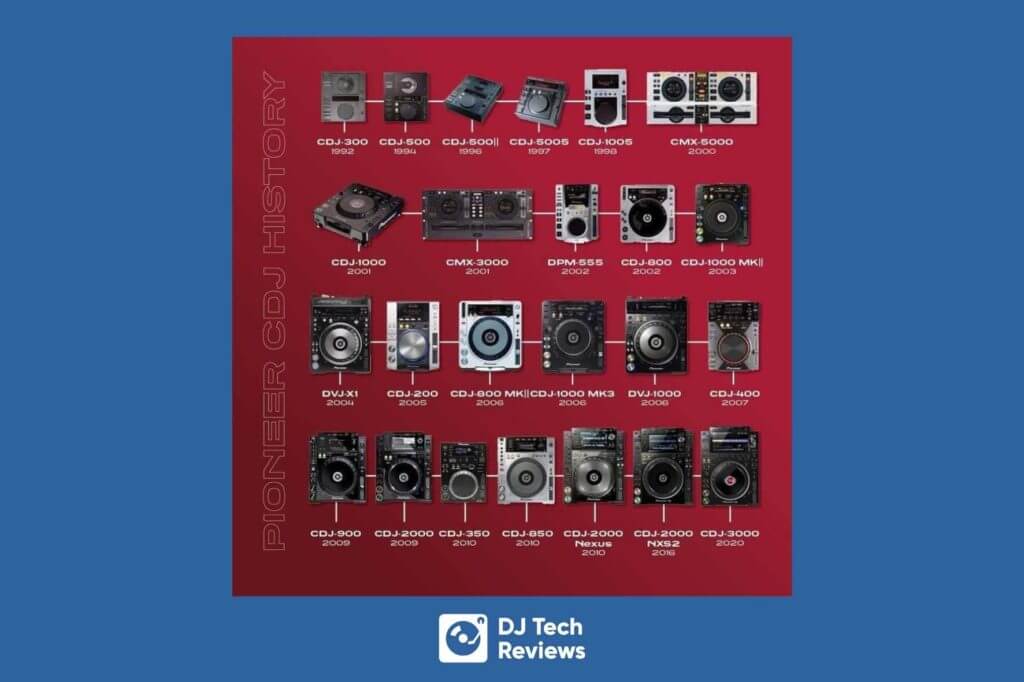
Read this next: CDJs vs Turntables (Which DJ Setup is Actually Best?)
The CDJ’s Origin Explained
Originally unveiled in the mid-90s via Pioneer DJ’s CDJ controller, the CDJ was meant to be unlike anything that had come before it.
Where traditional DJs relied on the use of vinyl records via a turntable device, mixing entirely by ear and rhythm, the CDJ was the first device implemented that allowed a DJ to use
and sync features to assist them to improve the DJing process.
This extends even to the CDJ’s name.
As they were meant to help DJs with transitioning from vinyl records and tapes over to CDs, the device was appropriately named a “CDJ”, mixing ‘CD’ with DJ.
Today, even despite the favorable use of the DJ controller, and the large number of people going back to the old-school turntable, the modern CDJs are still the gold standard when it comes to DJing, being the item most used in clubs and other venues.
Read this next: CDJ vs XDJ (Which Unit is Best?)
CDJs vs. Controllers: Core Differences
Depending on who you ask, the CDJ and the DJ controller may or may not be regarded as two entirely different devices. One side argues that the two devices are completely different, with the CDJ being more in-line with a “digital music player” similar to the turntable.
From their perspective, because CDJs don’t need a laptop connection, it doesn’t fall into the same realm as a controller, for which a laptop is an essential requirement.
On the other hand, there is just as vehement an argument that says that the CDJ is very much a controller, albeit just structured differently.
From this side, it’s argued that, while they don’t directly use a laptop like standard controllers, this is because the DJ software that is used by controllers via their laptop is already integrated into the unit themselves. Essentially, this means that, from a software use standpoint, controllers and CDJs are functionally the same things.
Of course, just because the two devices both use DJ software to perform their mixing doesn’t mean that they are inherently copies of each other or share any qualities. In fact, by pitting the CDJ against the DJ controller, you can better see just how different the devices are from one another, even if you do find yourself in the “same” category.
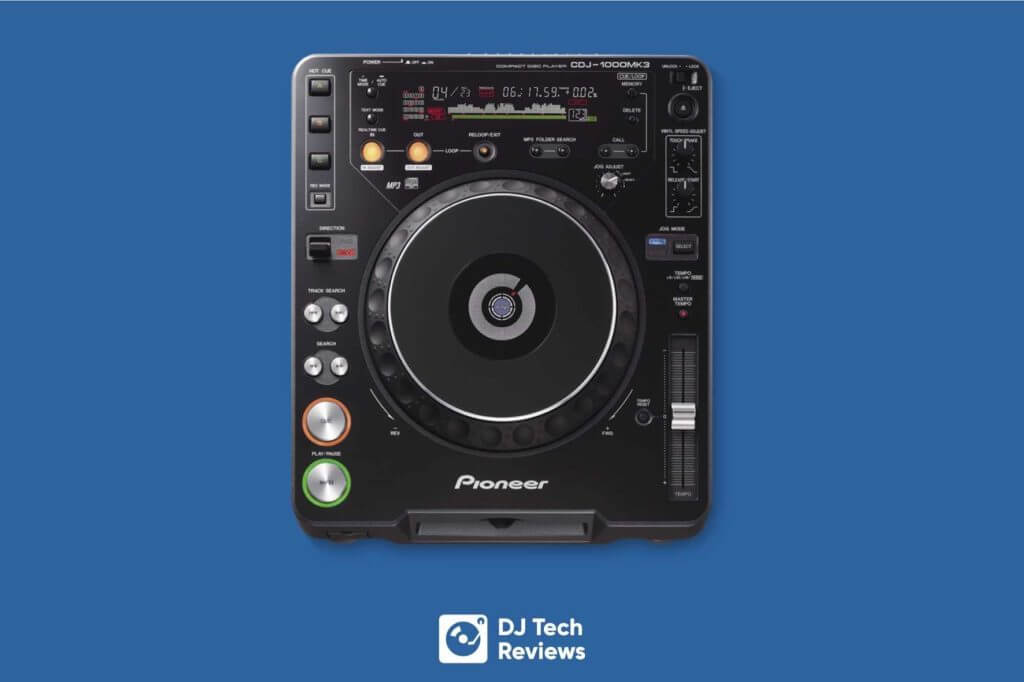
Read this next: CDJs vs DJ Controllers (Which Tech is Best?)
Difference #1. Laptops
This is the elephant in the room and the key factor in the debate on whether a CDJ is or isn’t part of the controller family. That elephant is essentially the use of a laptop to run DJ software for the device.
For the vast majority of DJ controllers, a laptop is required to run the various DJ software types out there that both load and play the different music tracks. Software types, like Serato, Traktor, Virtual DJ, or Rekordbox help modern DJs more effectively perform their mixes by displaying essential pieces of information, like waveforms, BPMs, and the beat grid for a track.
They also can be used to implement various effects or features unique to that software.
CDJs, on the other hand, have many (though not all) of these features as well. The difference is that, while DJ controllers require a laptop to access these software options, most CDJs have the software already built into the device itself, having a digital display that can be used to look over the different parts of a track, like its waveform or BPM.
There are pros and cons to both of these options and depends on the DJ at that time. For some, having the ability to choose the type of software they want to use via a controller works best for them. Conversely, others like the convenience afforded to them by the CDJ already having everything built-in and not needing to carry a laptop just to look at the important aspects of a track’s information.
Difference #2. Available Channels
One of the things that are wholly in the CDJ’s favor is the number of available channels afforded to it when compared to the controller.
Generally, a controller will have between two and four channels available, even on the higher-end devices. This is running about the standard to below standard when it comes to the CDJ, which can have eight or more available channels.
This is based on how you set your CDJ up and what you connect where. It also deals with how many channels your mixer will allow, again something that a controller simply doesn’t let you control.
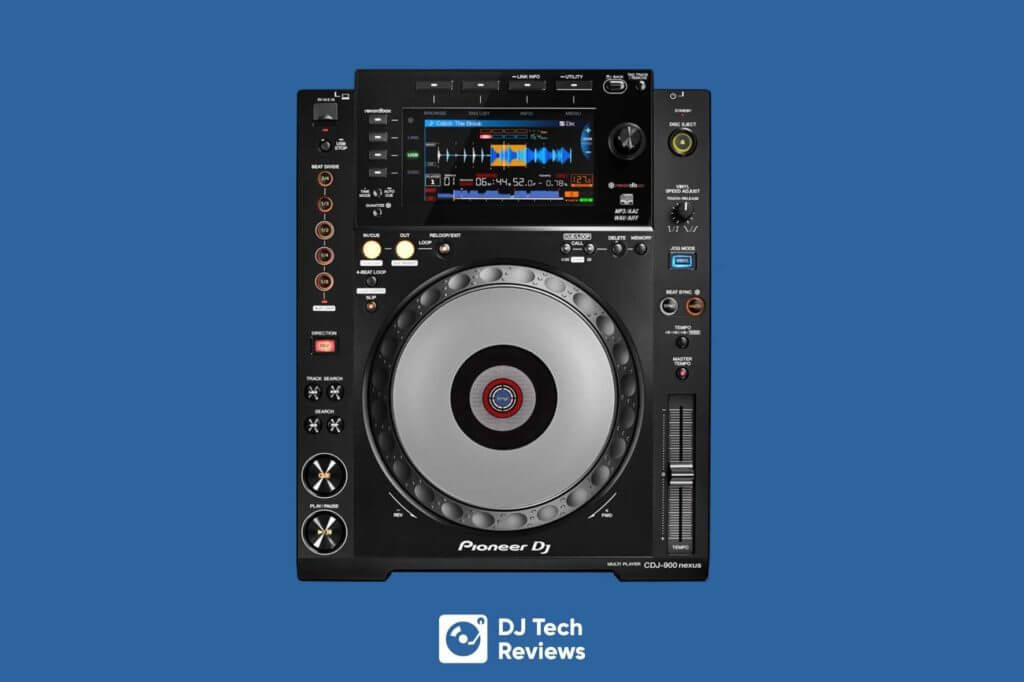
Read this next: We Love The Pioneer DJ CDJ-900NXS And So Will You
Difference #3. Features
Another big difference between CDJs and DJ controllers is their approach to various DJ tools and features.
Where most mid-to-upper-end controllers will have different things like a “SYNC” button included, that isn’t necessarily the case for the CDJs.
In those cases, a CDJ may only have a BPM slider and a few other physical buttons and knobs, not having a physical sync option at all.
Generally, a CDJ will have some of these as digital inclusions, but even then it isn’t a guarantee. This can certainly be a bit of a downside, especially if you’re used to certain optional inclusions.
Difference #4. Individual Hardware
The last difference is also the biggest disadvantage for the CDJ, and that’s the fact that a CDJ is only a single piece of a three-part setup.
In addition to your CDJ device, you’ll have to invest in another CDJ device as well as a separate independent mixer option.
This is a far cry from the setup offered to DJ controller users, who have everything included as an all-in-one option. In addition, you can expect to pay considerably more for a CDJ setup to be fully realized when compared to what you’ll spend on a DJ controller, even if you’re getting something on the higher spectrum of prices.
There is one upside to this, however, and that’s the fact that, unlike DJ controllers, which have a largely universal feel for both decks as well as the mixer (for better or for worse), having each piece come individually, you can work to build your CDJ setup in unique ways, with two different CDJ decks and a different mixer.
This freedom is great for people that want to mix and match different features along with different devices.
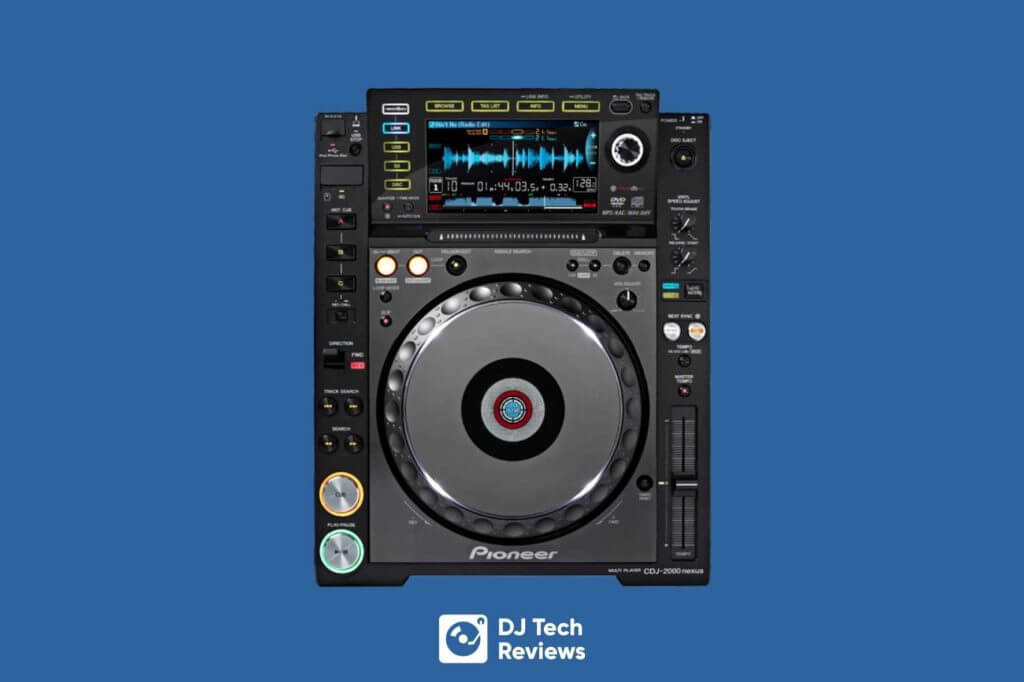
Read this next: The CDJ 2000 Nexus 2: Still Top of the CDJ Game?
What Makes CDJs Club Standard?
Where the DJ controller is too digitally reliant and the turntable is a bit too physically reliant, the CDJ has come as an impressive middleman device that handles pretty much all the deficiencies of either option, creating very few additional problems of its own.
These solutions helped make it the gold standard of devices that is still primarily used in clubs and venues even to this day.
Convenience (Vinyl is heavy!)
This may seem like a bad thing at the outset, but the reality was that, before CDJs, many vinyl DJs would carry around heavy, large boxes of vinyl records if they wanted to perform.
This opened up a ton of problems, including the chance that their records may be broken or stolen during a performance.
CDJs fixed this issue by allowing, in addition to their CD options, the ability to simply insert a USB drive. Now, a DJ could perform just as many songs without fear of losing a record or having to carry large boxes when they wanted to perform.
In a word, CONVENIENCE.
DJ Roots
The other big reason that CDJs became as universally regarded as they were was that, while they would continually have digital aspects included, they still made a point of ensuring that DJs knew and honored their roots.
As an example, while CDJs did add many displays over in their device (such as the BPM or waveform), they also made sure to include various physical things like a jog and spin wheel, which acts much like the original turntables. Similarly, they even removed certain controller-based options, like the sync button, forcing DJs to know how to beatmatch manually.
This method, while more time-consuming, often led to a much more precise and higher-quality matchup of tracks when compared to the automated (and often faulty) sync button that controller users would rely upon.
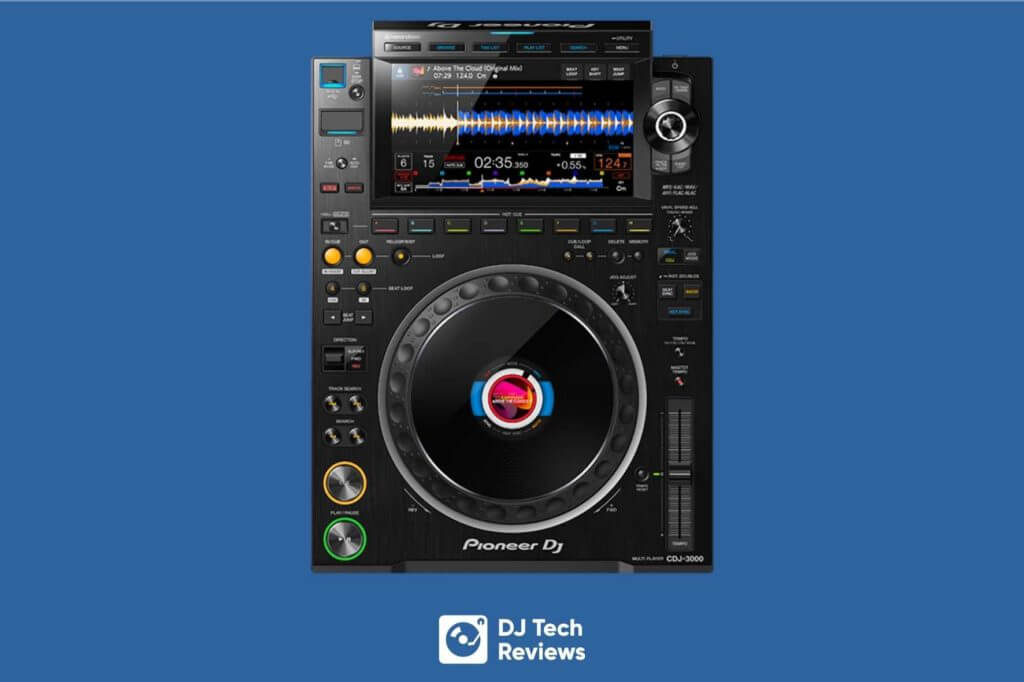
Read this next: Pioneer DJ CDJ 3000: The Fully Featured Media Player You Dreamed About
What is a CDJ? Takeaway
The CDJ is and will continue to be an incredible device that all DJs should be aware of, and professional DJs should be able to use.
They have established for themselves a very special place in DJ history and have been instrumental in transitioning from the physical vinyl option to the much more accessible digital.
While there is certainly an argument that can be made for a DJ starting with CDJs, I don’t agree. I recommend all beginners first cut their teeth with a starting DJ controller, then, as you learn what you can do with a track, and all the different ways you can mix music, you can opt to jump over into the CDJ section of things.
CDJs are, and will always be, the perfect bridge between hardware, software, and a DJ’s skill.
By building up and mastering this device, you put yourself on a direct path to becoming a stellar and very capable professional DJ.



